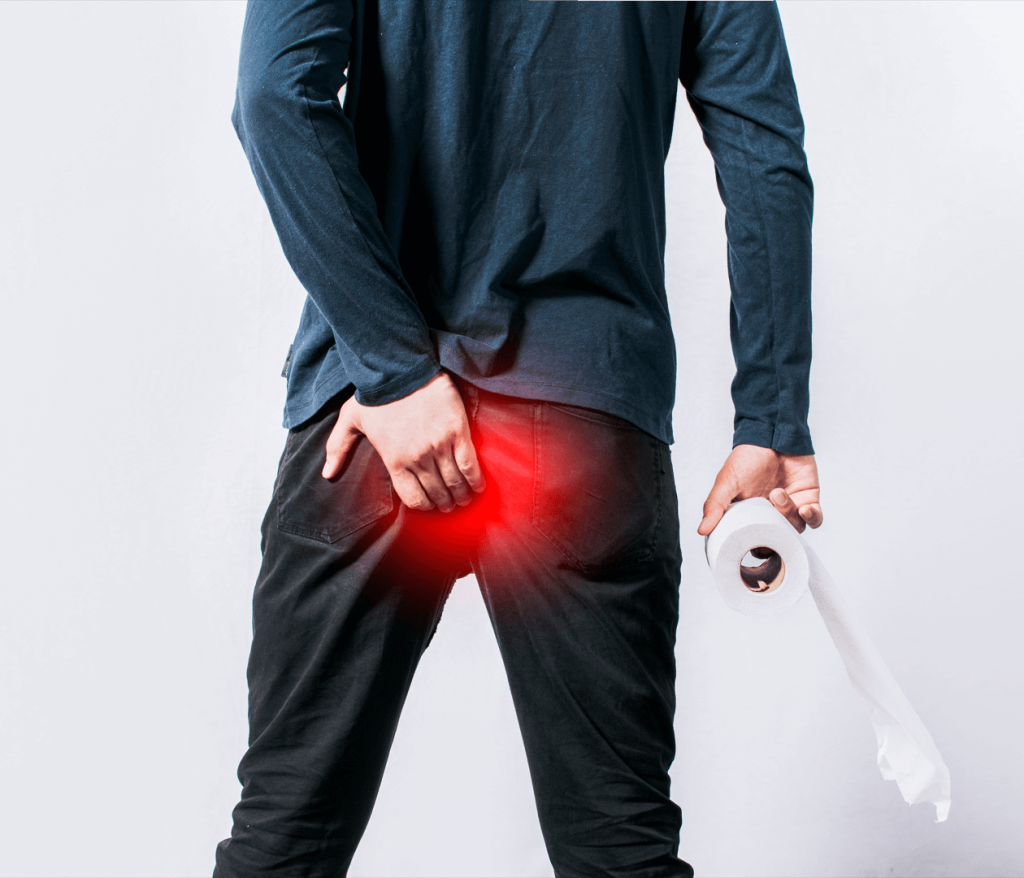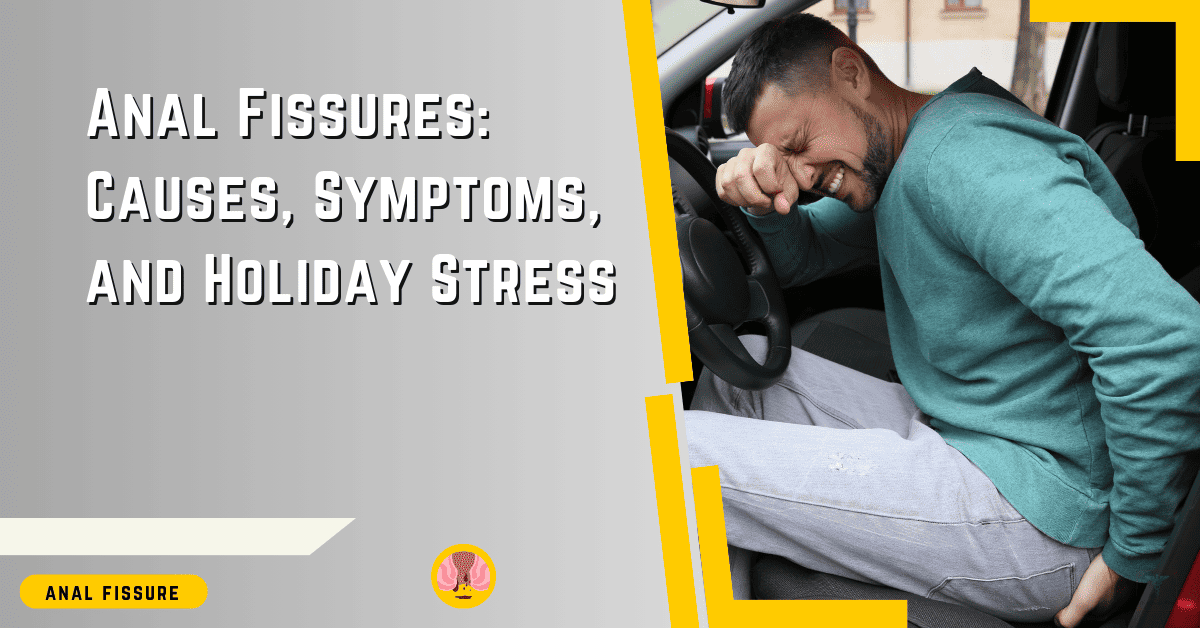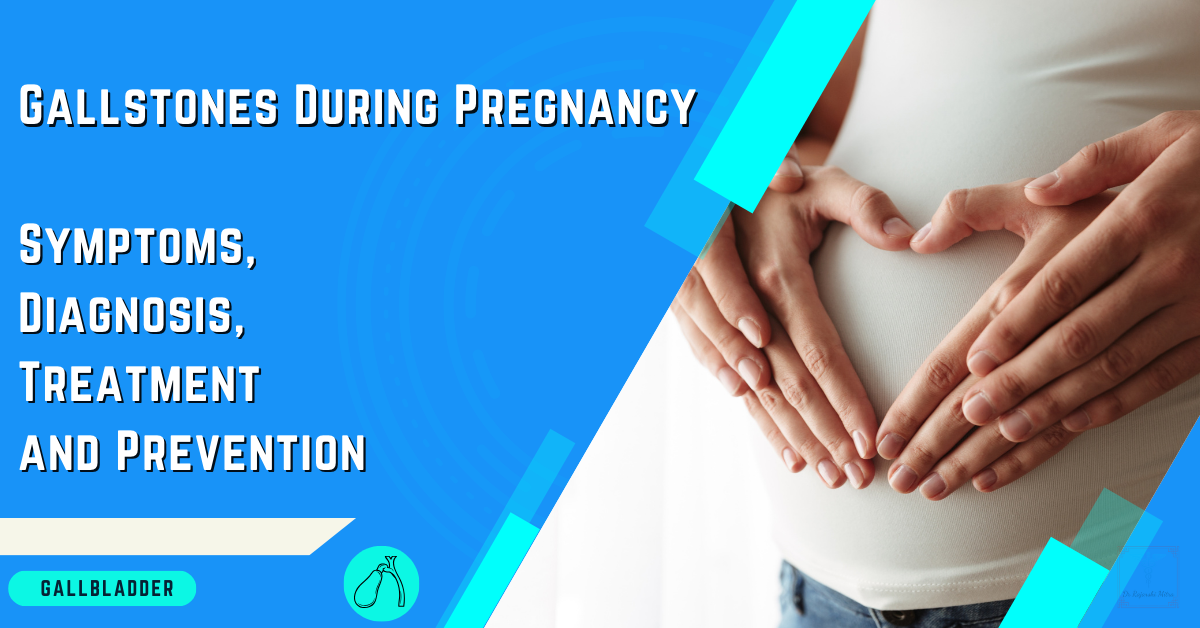As the festive lights twinkle and the air fills with the scent of holiday spices, it’s hard to imagine that this season of cheer could have a dark side for your health. Several anal fissures causes that can trigger pain can instantly shift your holiday mood.
Yet, you may find yourself grappling with an uncomfortable condition known as anal fissures, a testament to the not-so-jolly impact of holiday stress on your body.
Characterized by a sharp pain that can turn a simple trip to the bathroom into a dreaded experience, these small tears in the skin of the anus are not only painful but can also be a sign of undue tension in your life.
You’re not alone if you’re experiencing discomfort or spotting blood after bowel movements; these are telltale signs that shouldn’t be ignored.
As you prepare for the festivities, consider the silent toll that stress might be taking on your physical well-being, and stay with me as I unveil ways to manage and potentially ease this seasonal affliction, ensuring that an unwelcome visitor doesn’t dampen your holiday spirit.
Anal Fissures Causes & Symptoms: Highlights
- Anal fissures are small tears in the lining of the anus that the passage of hard stools can cause.
- Symptoms of anal fissures include rectal bleeding, visible tears or cracks in the skin around the anus, itching, irritation, and anal sphincter spasms.
- Risk factors for developing anal fissures include habitual straining during bowel movements, muscle tension within the anal sphincter, and inflammatory bowel disease (IBD).
- Holiday stress, irregular routines, and changes in diet during the holidays can contribute to the development or exacerbation of anal fissures.

Understanding Anal Fissures
Anal fissures, though common, are small tears in the lining of the anus that can cause significant discomfort and bleeding, particularly during bowel movements.
Acute anal fissures arise suddenly, often triggered by the passage of hard stools that strain the delicate lining of the anal canal. You may experience sharp pain during bowel movements, which is the result of the tear involving the anal sphincter, the muscle controlling the opening and closing of the anus.
Chronic anal fissures persist beyond several weeks and may lead to further complications. Not only do they produce recurrent episodes of anal pain, but they also compromise blood flow to the area, hindering healing and potentially contributing to complications such as fecal impaction or fistula formation.
Effective management of anal fissures includes addressing the immediate symptoms and preventing recurrence. Dietary adjustments to soften stools, gentle anal hygiene practices, and over-the-counter or prescription treatments can alleviate your discomfort.
If you notice persistent or worsening symptoms, it’s crucial to seek medical attention.
Identifying Symptoms
If you’re experiencing pain during bowel movements, it’s possible you may have an anal fissure, a condition also marked by bright red blood on your toilet paper or in the bowl post-defecation.
The discomfort you’re feeling isn’t uncommon; anal fissures are small tears in the lining of the anus, causing significant pain, especially during and after your bowel movements.
The symptoms of an anal fissure can be quite distinctive, and it’s important to be aware of them to seek timely treatment:
- Bright Red BloodSeeing red blood on your toilet paper or spotting it in the toilet can be a sign of rectal bleeding from a fissure.
- Skin TearA visible tear or crack in the skin around the anus often confirms the presence of an anal fissure.
- Anal DiscomfortItching or irritation, along with muscle spasms known as anal sphincter spasm, are indicative symptoms.
Pain from a fissure can be acute and may lead to anxiety or dread surrounding bowel movements.
Identifying these symptoms early allows for a sense of belonging among those dealing with this painful condition and paves the way for seeking support and effective treatment options.
Uncovering Causes
Understanding the underlying causes of anal fissures is crucial for prevention and effective treatment. An anal fissure is essentially a small tear in the thin, moist tissue lining the anus, and identifying the factors that contribute to its development is paramount.
One of the primary causes is the passage of large or hard stools, which increases stress on the anal canal during bowel movements. This strain can result in significant tears along the anal margin.
Moreover, habitual straining during bowel movements, often due to constipation and straining, exacerbates the risk of developing an anal fissure.
Such repetitive straining can’t only initiate but also aggravate an existing fissure. Muscle tension within the anal sphincter, particularly a spastic anal sphincter, further complicates stool passage, increasing the likelihood of pain and tears.
Inflammatory bowel disease (IBD) is another condition that inflames the anorectal area, elevating the risk of fissure formation. A chronic fissure, which persists beyond the typical healing time frame, often results from ongoing stressors like these.
Recognizing these risk factors is essential. Whether it’s mitigating the impact of hard stools through dietary changes or addressing muscle tension with medical intervention, you’re empowered to take proactive steps toward your well-being.

Holiday Stress Connection
Recognizing these risk factors, you should also consider how the festive season may intensify symptoms of anal fissures, as holiday stress often leads to increased tension and irregular bowel movements.
The holiday stress connection to anal fissure discomfort is significant and warrants specific attention. Here are some critical points to keep in mind:
- Increased tension from stress can lead to excessive straining during bowel movements.
- Rich holiday foods may disrupt your diet and bowel habits, contributing to constipation or diarrhea.
- Irregular routines and travel during the holidays can exacerbate symptoms by altering your normal bowel patterns.
As you navigate the holiday season, it’s essential to maintain health information at the forefront of your mind. The common causes of anal fissures, such as constipation and straining, can be intensified by holiday stress.
To prevent constipation, prioritize fiber intake and hydration. If you experience pain and bleeding, a sitz bath may offer relief and is a recommended health care practice.
Treatment and Management
When dealing with an acute anal fissure, you may find relief through self-care measures such as increasing fiber intake and taking sitz baths.
The warm water of a sitz bath can help relax your anal muscles and promote blood flow, which is crucial for helping anal fissures heal. Should these measures not suffice, it’s important to consult with your healthcare provider for additional strategies.
Prescription creams, for instance, may contain lidocaine to alleviate pain temporarily. For chronic fissures, medical treatment aims to relax the sphincter muscles, thus improving blood flow to aid healing.
Your doctor might prescribe nitroglycerin ointment, calcium channel blockers, or even Botox injections to achieve this relaxation.
In cases where conservative treatments haven’t prompted healing, an internal sphincterotomy could be the next step. During this procedure, a surgeon makes a small cut in the internal sphincter to reduce spasms and pain, facilitating the healing process.
Before any surgical intervention, a thorough examination, often involving a gloved finger or digital rectal exam, will be conducted to rule out other conditions, such as treatment for cancer, ensuring that the appropriate management plan is implemented for your unique situation.
Final Note From Dr. Rajarshi Mitra
As the year winds down, don’t let the specter of holiday stress cast a shadow over your health. Remember, the discomfort of anal fissures can be managed.
Be proactive—heed the warning signs like pain and bleeding, and adopt a gentler lifestyle to ease the strain on your body.
With the right approach, you can navigate this festive period smoothly and enter the New Year with wellness in tow, leaving the pain in the past where it belongs.
FAQs
Why Do I Keep Getting Anal Fissures?
Wondering why you’re repeatedly battling anal fissures? It’s likely due to poor fiber intake, inadequate hydration, or incorrect toilet posture. Ensure regular bowel movements, attend to anal hygiene, and seek medical advice for persistent issues.
Does Exercise Help Heal Fissures?
Yes, exercise can aid in fissure prevention by enhancing blood circulation, reducing stress, and strengthening your pelvic floor through gentle workouts, mindful movement, and stretching benefits, especially with healing yoga positions and proper post-workout care.
How I Healed My Chronic Fissure?
You’ve navigated the rough seas to calmer waters, healing your chronic fissure by embracing high fiber intake, sitz baths, and natural ointments. Gentle wiping, stress management, and prioritizing hydration underscored your journey to relief and recovery.
What Should Be Avoided in Fissures?
To manage fissures, avoid hard stools and spicy foods, reduce alcohol, increase fiber, stay well-hydrated, and use soothing baths and topical ointments. Focus on constipation relief and stress reduction for healing.



















